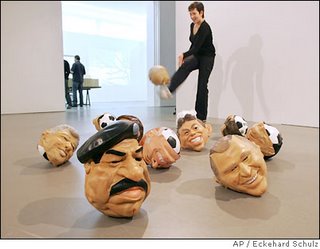Coffee with Young Creative of the Year, Avinash Sampath

DC: A little about humility, after winning a creative of the year honor many creatives would bend backwards and insert their entire torso up their own asses and hibernate. You on the other hand, have pumped out even better work and based on what people say have managed to remain humble...how do you defy vanity?
A: Hahaha… For a start, my ass is too small so that negates the twisted torso theory.
But seriously, I have a super-crush on advertising. I am in love with the creative process. And outside of chopping vegetables, quoting dialogues from ‘Pulp Fiction’ and planning my wife’s birthday, creating ads is the only thing I know how to do.
Every idea is my way of telling advertising, “I love you.” And every little success that comes my way is advertising telling me, “I love you too.” So to answer your question, vanity doesn’t feature in this relationship.
DC: So You have Won a number of honors, to mention a few, Young Creative of the Year and TV spot of the year for Crest. Saying things look good would be an understatement. But underneath all the love what do you hate about what you do?
A: I hate the 9am start. I hate the fact we think a 3-ad campaign and a 30-second TV spot is the solution to every client’s every problem. I hate it that we don’t take enough risks. I hate the fact that client servicing tends to second-guess the client and the client tends to second-guess the consumer. I hate the assumption that a creative award means the creative person did something right and an effectiveness award means the servicing person did something right. I hate it that we forget we are in the field of communication. We forget we have the power to influence people’s minds and hearts. I hate that our ads are careful to keep within the realms of what people think and know.
Somebody wise once said, ‘If Columbus had done research he would’ve only known the earth was flat.’
DC: 3 So 5 years from now you open the doors to your own agency, Whats the first thing you'd do? and what would you do differently in your own agency?
A: I’m not nurturing a dream of starting my own agency, but to go with your flow…
First thing I’d do: Make sure my name isn’t the agency’s name.
What I’d do differently: I’d make sure it isn’t on the high floors of a building with a mirror façade. What an agency looks and feels like reflects in the people it hires and the work it produces. It would be a wooden building. There would be no more than four walls. On second thought, add another four for the toilet. There would only be creatives, planners and an accountant who ensures our salaries reach our bank accounts. Creatives would need to sell their own work. When they understand the client and the brand, the work will sell itself. And when the client trusts his/her creative, the work will get better.
Mohammed Khan, a hugely respected Indian creative and founder of hot-shop Enterprise said, “The best agencies in the world are ones headed by creatives. It’s the same reason why the best law firms are headed by lawyers and the best accounting firms are headed by accountants.”
So my agency just might survive. :)
DC: So who would win the Avinash Awards in the region:
Idea of the Year?Best Print?Best TV?Best Outdoor?Agency of the Year?
A: The judges have reviewed this year’s work with an extremely critical eye. Sadly this year’s Avinash Awards will have loads of free booze, but no awards. Sorry. :(
DC: Your Cannes Predictions:Grand Prix?
A: Not Sony Bravia’s ‘Bouncing Balls’. Not Honda Civic’s ‘Choir’. Not XBOX’s ‘Join In’.Regions entries? Five finalists (don’t know which ones). Metal (don’t know which colour) on the way to BrandCom’s Mmmousepad and Tonic’s Sony Microvault Campaign.
DC: World Cup?
A: I could say Brazil, but then it wouldn’t be my prediction, it would be everybody’s!
Personally, I think it would be great to see a new winner emerge: South Korea? Croatia? Ecuador?
DC: So advice to the young from the young?
A: I’ve been playing this advertising game for almost ten years, so I don’t know if I’m still on the young side of things. Nevertheless, if you’re starting out in big bad ad-land and aren’t pressed to leave your computer screen for the World Cup, here are a few words of advice:
(a) Embark on a steady diet of advertising annuals. Any book that features ads as editorial, read it and re-read it till your eyes bleed and when the blood blurs your vision tear out the pages and eat them. Ad annuals are your greatest source of inspiration. They will rub in your face ideas better than yours. Their index columns will ask you, “Why isn’t your name here?” And if you’re spending a night at the agency, they are trustworthy pillows.
(b) Think options. Urban advertising legend has it that superstar C.D. David Droga demanded to see 30 (T-H-I-R-T-Y) options for every brief delivered to his creative teams. These teams now collect Frequent Flier Points in the previously mentioned ad annuals. So yes, this advice works.
(c) And lastly, the best ads are created on state-of-the-art, unlimitedGB-hard-disk, super-flat-screen machines. Your IT Manager might not have them. They’re called ‘scribbling pads’.
DC: Advice to the old from the young?
A: Aaaah… something the old have been telling the young for years.
Well it’s time to return the favour, “You’re only as good as your last ad.”
DC: Pleasure having you with us Avi'
















